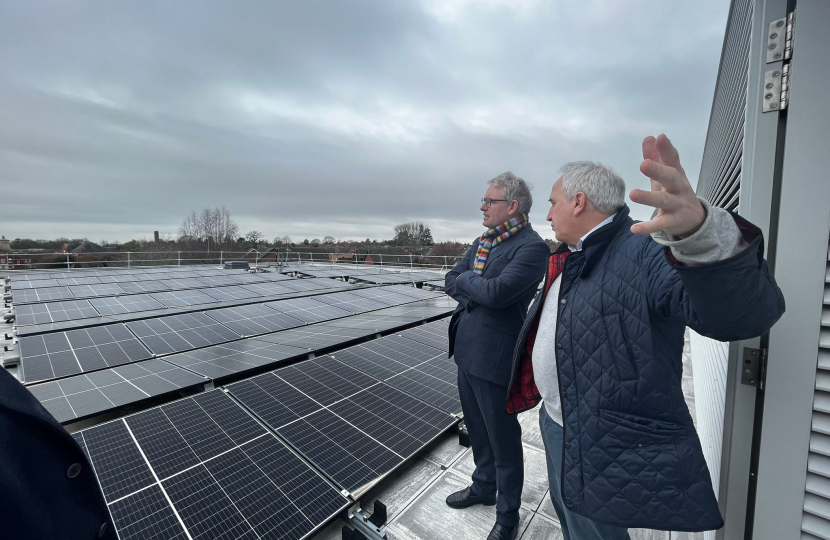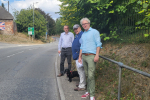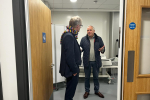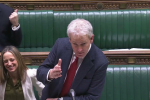
They won’t be photos I use on campaign literature next time round, but Matt Hancock and I stood in a muddy field in November 2019 pointing to where the new Devizes Urgent Care Centre would - if we were elected on 12 December - in due course arise. We were elected, and at last it has arisen. I had a tour of the new facility with Dr Richard Sandford-Hill, the local GP who led the campaigning for this project (with my predecessor Claire Perry O’Neil, to whom goes much of the credit). It is a state-of-the-art, multi-purpose outpatient centre and a huge asset for the town and surrounding areas. With the GP clinic next door and the modern Green Lanes mental health facility over the road, Devizes now has a health campus which is surely bigger and better than that of any comparable town in the country.

There are of course huge challenges in the NHS, not least in primary care where people struggle to see a doctor or dentist. I discussed these issues at some length with another great local doctor, Nick Maurice of Marlborough - the sixth generation of his family to practise in the town since Dr Thelwall Maurice arrived in 1792. We agreed that one problem with the modern NHS is that, in Dr Maurice’s words, ‘everything has been dehumanised’: bureaucratic systems have replaced human relationships. We filmed our conversation, in the council chamber of Marlborough Town Hall, and you can watch it (it three chunks) here, here and here.
In the 1790s Dr Thelwall Maurice rode his horse over the downs to the little village of Swindon, and there dispensed, depending on the patient’s symptoms, either his red pill or his blue pill. These days, we have Great Western Hospital. As with Devizes, GWH is benefiting from major capital investment, with a new Urgent Treatment Centre already built and, last month, the start of a new £32m extension of the Emergency Department. I had a look round with Kevin Macnamara, the Chief Executive. The best thing about GWH isn’t capital works, however: it’s the ‘Coordination Centre’ which tracks every patient from the first referral or 999 call, through their stay in hospital and back home or into social care. It’s a model for a more integrated, more efficient, more patient-centred healthcare system, and attracting interest from across the country. Here it is.

Wiltshire has a lot of roads. I attended a big meeting called by Councillor Caroline Thomas in Marlborough to discuss all the issues affecting traffic in and the town, and found the same issues I hear everywhere: too much traffic, especially HGVs, and too many potholes. I have since met the Roads Minister in Parliament to push, once again, for a solution to the excessive freight traffic on the A338/A346, which is the same size as when Dr Thelwall trotted up and down it in the 18th century, but is now a route for massive lorries heading to and from Swindon. Meanwhile the Kafkaesque nightmare continues for the 55 households of Victoria Park, on the edge of Erlestoke Prison near Great Cheverell, whose roads are utterly ruined, the village green a wasteground, the streetlights broken and the drains all blocked - because the Ministry of Justice can’t organise the transfer of the estate to the council, and so everything is falling apart. I am calling on all the ‘stakeholders’ to come to a big meeting and not leave until we have a plan.

Westminster has been preoccupied with Northern Ireland and with the small boats. On NI, I am impressed that the PM has managed to get the EU to give him what they never gave Boris Johnson: a commitment to a system that eliminates checks on British goods destined for the NI market. The detail of the Windsor Agreement is devilish, however, and we still need to be sure that the promised ‘green lane’ for GB-NI goods will be as frictionless as trade within a single country should be. It is also important that the EU - via the European Court of Justice, whose rulings could still guide the independent arbitration mechanism we have agreed to use in the event of disputes - does not still regulate the economy of the NI, and therefore (because we don’t want internal divergence) the rest of the UK.
On small boats, the new Bill announced last week is absolutely right in principle. The UK has given refuge to 450,000 people since 2017, and we will continue to be one of the most generous countries in the world in respect of asylum. But we simply can’t take all the tens of millions of people who would like to come here, and who qualify under the UNHCR definition of refugees. We need a better, single safe route, with a realistic cap on numbers; and we need an absolute bar on people accessing the system by travelling here illegally. There are a lot of questions to ask about implementation - processing capacity, and detention capacity, and agreements for returns and removals - but I am glad we have asserted the necessary ban on illegal entry. The question is whether the courts, here and in Strasbourg, will judge this law compatible with the European Convention on Human Rights. My view is that if there is a clash between the policy and the Convention, the problem is with the Convention - or its interpretation by our courts. I made this point, and a plea for a proper Community Sponsorship system for refugees, in a question to the Home Secretary in Parliament (see here).
This weekend the dominos of the global economy are wobbling, with the collapse of Silicon Valley Bank (SVB). I sit on the Treasury Select Committee, and we have been interrogating ministers and the Bank of England recently about the various innovations that technology is bringing to finance - cryptocurrencies, stablecoins, the digital pound. SVB backed a whole host of tech innovations, but what happened on Friday was a very conventional bank run, as depositors suddenly realised their capital was at risk. It’s the biggest single shock to the financial system since the terrible events of 2008, and I hope we have learned the lessons of that time: that bail-outs and money-printing, tempting as they are in a crisis, do not pay.






